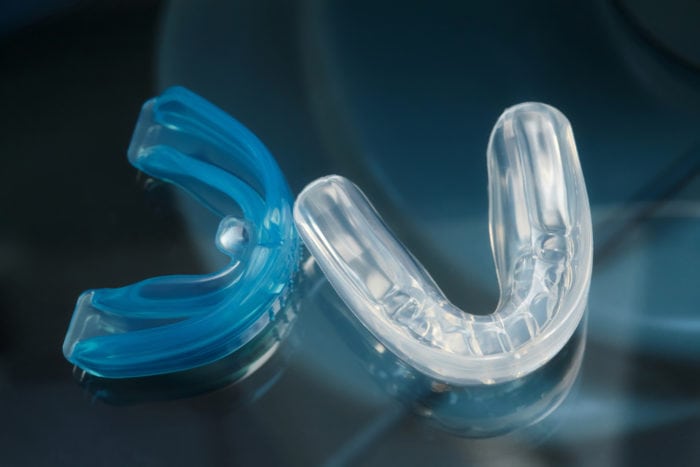Mouthguards An Overview
Custom-designed mouthguards offer superior benefits over store-bought mouthguards. Custom-made mouthguards are designed with your specific measurements and oral needs in mind. Whether you are participating in contact sports or you’re an avid adventurer, custom-made mouthguards can help benefit you in the long run.
Custom mouthguards fit snugly over the teeth, allowing for a more focused performance. Athletes are able to focus on their performance rather than dealing with an ill-fitted mouthguard during their sports practice or game. With custom-designed mouthguards, patients are able to speak and drink comfortably without removing their mouthguard, reducing the risk of misplacing their mouthguard.
Taking preventive measures to protect your teeth and gums can help you save time and money in the long run. Many dental emergencies occur during physical contact sports. Wearing a custom-designed mouthguard can help you reduce your child’s risk for injury to the teeth and gums. To learn more about custom-designed mouthguards, speak with one of our experienced team members at LIFESmiles Laser & Cosmetic Dentistry.
Professional Vs. Over-The-Counter Mouthguards
Custom professional mouthguards provide a level of comfort, protection, and durability that over-the-counter options simply can’t match. While store-bought mouthguards may seem convenient, their one-size-fits-all design often leads to poor fit, discomfort, and limited protection.
In contrast, our dentists design a custom mouthguard specifically for your mouth using detailed impressions or digital scans, ensuring it fits perfectly and provides maximum coverage. This personalized fit allows you to breathe, talk, and perform comfortably, whether you’re wearing it during sports or while sleeping.
The superior fit of a professional mouthguard makes it much more effective at preventing dental injuries. For athletes, a custom mouthguard absorbs and distributes impact evenly, reducing the risk of chipped teeth, jaw injuries, and cuts to the lips or gums.
For patients who grind or clench their teeth at night, known as bruxism, a custom nightguard protects enamel, eases jaw tension, and prevents long-term damage. Over-the-counter mouthguards often fail to stay in place or provide full coverage, which limits their ability to protect your teeth and gums from impact or grinding forces.
Durability is another significant advantage of professional mouthguards. Custom mouthguards are made from high-quality materials that maintain their shape and protective qualities even after years of use.
With proper care, they can last several years before needing replacement. In comparison, store-bought mouthguards are made from softer materials that wear out quickly, lose their shape, and require frequent replacement. Although over-the-counter options may cost less upfront, their short lifespan can make them more expensive in the long run.
Custom mouthguards also provide a level of personalization that mass-produced versions cannot. Your dentist can tailor the design, thickness, and materials of your mouthguard based on your individual needs.
Whether you need protection for contact sports, relief from teeth grinding, or cushioning for jaw discomfort, a custom mouthguard can be made specifically for that purpose. Even patients with braces or dental restorations can have their mouthguards designed to protect orthodontic work while maintaining comfort.
Can I Use a Mouthguard for Multiple Conditions?
If you have a nightguard or sports mouthguard, it’s tempting to want to use one guard for both conditions. However, it’s important to only use them for the task they’re designed for. Otherwise, you aren’t getting full protection.
A sports mouthguard is made of a lighter, bulkier material because it absorbs shocks. If you tried to use one of these for teeth grinding, your teeth would start to wear through the guard. A damaged guard won’t be able to effectively protect your teeth during sports.
Teeth grinding mouthguards are made of a thinner, harder material. It prevents the friction between the two sets of teeth, so that they don’t grind together. This guard won’t be very effective when it comes to sports. It’ll barely be different than having no guard at all. You can damage both the guard and your teeth.
Caring for a Custom Mouthguard
Caring for a custom mouthguard properly is essential to keeping it clean, comfortable, and effective for as long as possible. Because a mouthguard spends hours in your mouth, it comes into contact with saliva, bacteria, and food particles that can cause odor, buildup, or even illness if not cleaned regularly.
After each use, you should rinse your mouthguard thoroughly with cool water to remove debris and saliva. Then, gently brush it with a soft toothbrush and mild soap or non-abrasive toothpaste.
Avoid using hot water, as heat can cause the mouthguard to lose its shape and compromise its fit. Once it’s clean, let it air dry completely before storing it. Keeping your mouthguard dry helps prevent bacteria and mold from growing on its surface.
Proper storage is just as important as regular cleaning. Always store your mouthguard in a ventilated case that allows airflow while protecting it from dirt and damage.
Avoid leaving it in direct sunlight, in your car, or anywhere it might be exposed to heat, as high temperatures can warp the material. If you have pets, be sure to store the case in a safe place, as mouthguards are a common target for curious animals.
It’s also important to keep your mouthguard and mouth clean before every use. Brush and floss your teeth before putting it in to reduce the transfer of bacteria. Occasionally, you can soak your mouthguard in an antimicrobial or denture-cleaning solution to give it a deeper clean and eliminate odors. However, make sure to follow your dentist’s recommendations for cleaning products, since some solutions can damage certain materials.
Regular dental checkups are an important part of caring for your mouthguard as well. Your dentist can examine it for wear, cracks, or signs of bacterial buildup that you might not notice at home.
They can also check that it still fits properly, especially if you’ve had dental work or changes in your bite. A worn or ill-fitting mouthguard won’t provide adequate protection and should be replaced as soon as possible.

